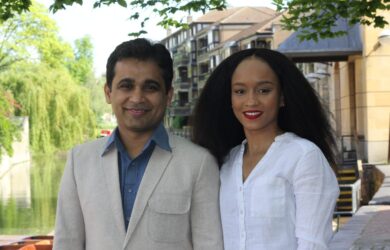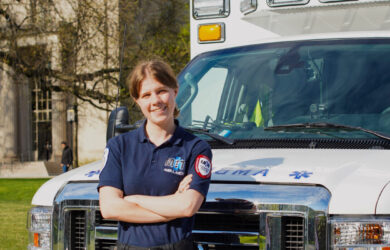
Scholar-Elect Alex Mentzel talks about how his PhD will bring his three passions - German literature, theatre and technology - together.
I have long believed that at the place where technology and the humanities meet, at the intersection of my three interests of theatre, German and technology, there lies fundamental insight into the questions of our time.
Alex Mentzel
Alex Mentzel has lived many careers and he’s still only in the first part of his life. Brought up in a musical family, he worked as an actor in film, tv and musical theatre, co-founded an app that aims to provide accurate and potentially life-saving information to people living in conflict zones and is now embarking on a PhD at Cambridge which seeks to bring all of that – and his experience of growing up in Germany – together.
Alex [2022] was born in Cologne. His American parents had moved there because they specialised in mediaeval, Renaissance and baroque music and it was easier to make a living in Europe. Alex won a scholarship to the Cologne Cathedral Choir School and would spend his summers at music festivals across Europe, listening to his parents discuss chant or their research into how their music would have been performed in the middle ages.
When he was nearly nine, Alex’s parents moved back to the US, to Eugene, Oregon, where his father took up a job in the University of Oregon as Professor of Voice. Moving to a small university town from a major city was a huge culture shock for Alex, who had a pronounced German accent. His new friends had parents with ‘more conventional’ jobs, but Alex had the opportunity to spend their summers in Europe, touring with his family. “It was a really unique childhood. It was incredible and I soaked it all up,” he says.
A taste for acting
Alex attended a French immersion school in Oregon and took half his classes in French. In Germany Alex had played the evil mayor in the Pied Piper of Hamelin and loved it. At the age of 10, he came home from school one day and told his parents he wanted to act. His parents were surprised – they had thought that if he went into the performing arts it would be as a musician. They were supportive, however, and, importantly, realistic about the world of the arts. After first cutting his teeth in community theatre, Alex was cast in his first film, Feast of Love, directed by Robert Benton. He played Greg Kinnear’s nephew. The film, set in Portland, Oregon, is a re-imagining of Shakespeare’s “A Midsummer Night’s Dream” and was a formative experience for Alex. Benton treated him like a professional actor, there to do his job. “There was an understanding that, even when you are young, you have a lot to offer. That has informed my approach to directing and in technology,” says Alex.
He continued to act as he grew up and returned to singing in his late teens after his voice broke. He says he and his family were wary of moving to Los Angeles despite his burgeoning acting career, wanting to retain aspects of a normal childhood. It was a formative experience, however, mixing professional acting and school work. He was meeting people from different backgrounds and having to bridge different worlds. Alex was homeschooled initially to help accommodate his acting work, but he participated in many local activities, such as community theatre, dance training, sports and choir, which meant he was not isolated at home.
Undergraduate studies
When he finished high school, he considered studying the performing arts and gained acceptances into several prominent conservatory acting programmes. However, he was worried about the cost of such programmes, even with scholarships, and was also keen to pursue other interests in addition to acting. So he accepted a place at the Clark Honors College, a small liberal arts college offering all the benefits of a major research institution housed within the University of Oregon, receiving a scholarship and getting a discount on his fees due to his father’s position. Although he majored in German literature and minored in Theatre Arts, the course meant he had to take STEM classes, which pushed him out of his natural comfort zone. “I discovered a way of problem solving and thinking through STEM which was different to my natural way of thinking,” he says. He adds that the choice of German literature connected him back to his early childhood and was to prove very important in his approach to the theatre and to understanding the world.
During his undergraduate studies, Alex spent two periods in Germany, co-founded a tech start-up and spent time in Los Angeles in the summers studying improvisation at the Groundlings, dance at Millenium Dance Complex and studying acting. That summer also saw him cast as a member of the Warblers in Glee, one of the biggest tv series of recent years. In New York, he auditioned for the role of the band leader Wallace Hartley for a production of Titanic which was due to transfer from the West End. He went straight from a callback to a costume fitting for the role, but like many shows, the musical was cancelled before opening night.
Alex’s venture into the tech world came about by chance. He had just returned from a fellowship in Frankfurt and Berlin studying Brechtian theatre at the Goethe Universität and working as an assistant director at the Künstlerhaus Mousonturm, a theatre that often collaborated with refugee ensembles.
He had previously spent time in Stuttgart as a ‘free mover’ while his father was on sabbatical there. At the time he had had a difficult time trying to get a visa. It was the height of the Syrian refugee crisis and Alex found himself trying to imagine how Syrians were faring in the German immigration system. “It was a Kafkaesque experience,” he says. “Even though I was American and spoke fluent German, I struggled with the bureaucracy. I wondered what the experience must be like for people without my advantages,” he says. That experience drove his interest in Brechtian theatre and led him to explore how relevant and effective it is both politically and artistically, including by working on drama and dance workshops with people from refugee backgrounds.
Tech start-up
After his six months of research in Germany, Alex returned to Oregon to write his thesis but was struggling with trying to bridge the gap between academia and making an impact in the world beyond the university wall. At the time President Trump’s immigration clampdown was taking effect. Alex met up with a friend who had spent time in refugee camps in the Middle East, and both agreed they wanted to help those in conflict situations. They had a mutual friend at the University of Oregon who was from Syria. The people from his village had fled due to a false rumour that ISIS was going to attack. They decided that they would collaborate on an app which could address misinformation in unstable environments.
The result was Averto, a community-moderated, crowdsourced app which allows communities to share reliable information which is vetted using crowd-sourced intelligence. They connected with a software developer in Texas who had built a mapping platform after personally experiencing the effects of conflict while studying at university in Libya. The app was launched in 2019 and allowed people to submit information about such events as missile strikes or checkpoints, which would be plotted on a live map as unverified alerts. Then a network of in-country moderators would vet the alerts. The app also generated statistical user ratings, providing insight into how reliable the information was. “It was about empowering communities and giving them tools they could use,” says Alex.
The app didn’t just cover conflict-related information. It also reported infrastructure issues including fuel shortages. By late-2019 it had 250,000 users in Libya and the team were looking at how they could turn it into a sustainable enterprise and partner with organisations such as the World Food Programme. Then Covid struck and all the contracts that they had been close to finalising were put on pause as attention shifted to public health. The app continues to be used in Libya and, given how this experience is informing his research, Alex hopes to pick those plans back up while he is doing his PhD.
Initially, Alex had planned to continue acting and working in technology after graduating, but Covid put paid to that. Soon after, he was hired to develop the “Corona Corps”, a Covid contact tracing programme that used students as contact tracers and aimed to reach people who were distrustful of public health messages. It was adopted across several different healthcare organisations in Oregon. Inspired by the information-sharing networks that developed between doctors and hospitals early in the pandemic, the Corona Corps helped set up research-sharing between other health and contact tracing authorities across the world.
Cambridge
After that role came to an end, Alex decided to continue his work in technology and applied to various scholarships. In 2021 he was admitted to do an MPhil in European, Latin American, and Comparative Literature and Culture at the University of Cambridge with the aim of combining his interests in theatre, humanities and technology. He soon decided he wanted to stay on at Cambridge and applied to do a PhD in German.
Early in his MPhil studies, he met up with Dr Annja Neumann, an expert in digital and medical humanities. She spoke to him about the idea for a FAUST SHOP, based on the Faustian bargains we make with technology, for instance, the rights we may give away when we sign up to digital platforms, Faustian bargains being those where we end up giving up more than we get in return.
The FAUST SHOP was something that immediately appealed to Alex because it dealt with the very real physical impact of technology. “The shop is an embodied space which explores how technology impacts us. Dr Neumann thought it would be a good home for my questions,” says Alex. He co-scripted and co-directed the theatrical element of the pop-up event, the New Lands performance. Described as an ‘augmented theatrical experience’, it adapts Johann Wolfgang von Goethe’s world-famous Faust to the digital age. “It aims to make the illegible aspects of the Faustian bargains we make with technology legible,” he adds.
In September Alex will start his PhD which will use 20th century German spatial and phenomenological theories in conjunction with Brecht and Kafka to explore how they allow us to understand the intersection of human and digital worlds. His aim is to get a firmer, more critical understanding of that impact in order to avoid the potential negative connotations and risks that we might not foresee, such as discriminatory systems of surveillance and gender and racial bias, consequences that will be amplified in cross-reality environments.
He says: “I have long believed that at the place where technology and the humanities meet, at the intersection of my three interests of theatre, German and technology, there lies fundamental insight into the questions of our time. Very quickly after arriving in Cambridge I found others who were engaging in a similar approach to these questions. The main reason I wanted to stay in Cambridge is that it is one of the few institutions that have a high level of interdisciplinary resources and collaboration between technology and the humanities. I look forward to being part of the generation that brings these interdisciplinary strands into collision.”
*More information on the FAUST Shop can be found here.












